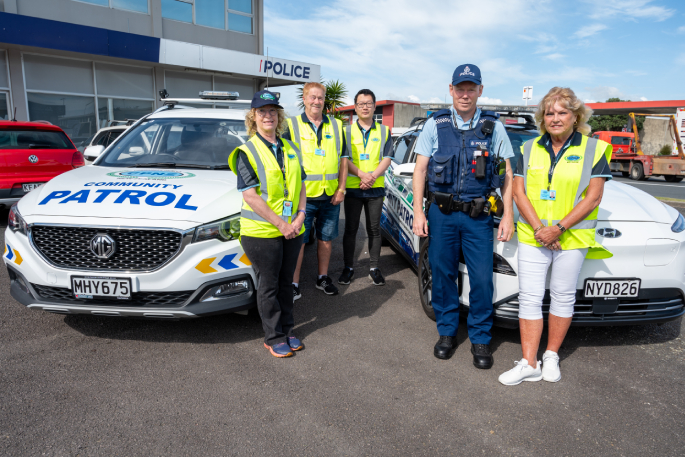Mount Maunganui is to get its own stand-alone community patrol – to be the eyes and ears for everyone in the beachside suburb.
Mount Maunganui Community Constable Mark Sanders, who is setting up the patrol, said the Mount Maunganui Community Patrol will cover Aratiki down to Sunrise Ave, Matapihi, Bayfair, Omanu and the Mount.
The voluntary group of citizens – who is made up of active retirees, workers and stay at-home parents – is looking for more members residing in these areas.
Sanders said the new patrol comes after a successful 20-plus years of community patrolling in the Mount by nearby patrols in Tauranga, which began before CCTV cameras were introduced in the holiday hotspot.
Sanders said the reason why a new stand-alone patrol is being introduced is to have extra eyes out there in the community.
“It’s so we can continue to empower communities to help NZ Police in preventing crime and reducing harm through an active presence in the community.
“Our [Mount] patrol will be affiliated to the national umbrella organisation, Community Patrols of New Zealand, which operates under a formal agreement with the NZ Police,” said Sanders.
The new Mount patrol group will follow the same lines of the very strong Pāpāmoa Community Patrol and be mentored by them until they are up and running.
Sander said community patrollers act as ‘eyes and ears’ for the police.
“Operating in organised pairs in a fully equipped, sign-written patrol vehicle, patrollers note any activity which is unusual or looks suspicious like late-night activity on an industrial or building site,” said Sanders.
The patrollers also help to look for missing people, track down missing vehicles, assist at vehicle crashes and generally support individuals needing assistance that they come across while patrolling.
“They contact the police immediately, via radio or mobile phone, to advise of any incident requiring urgent attention.
“A weekly ‘task sheet’ is provided by the police and a brief report (compiled during a patrol on an i-Pad) of patrol tasks and observations is lodged for police analysis.”
Sanders said prospective patrollers are formally vetted by police before selection. After initial training, CPNZ requires trainees to complete a course of 10 modules; then members will be rostered with senior patrollers to gain familiarity ‘on the job training’.
“Each member must sign a declaration of confidentiality and agree to abide by our Code of Conduct.”
Personal health and safety are a primary focus with the patrol operations.
Sanders said patrollers need to be aged 18-plus to join, and those above 25 are allowed to drive the patrol vehicle. There are no set hours, so patrolling people are able to work around their schedule.
Sanders said normal duties are a minimum of two patrols per month, either day, dusk or night, allocated via patroller preferences where possible.
A patrol is about 3.5 hours; however it can be longer or shorter if circumstances require.
The patrol dress code is ‘tidy casual’ but compulsory items when on patrol are a CPNZ polo-shirt and a ‘hi-viz’ vest or jacket marked ‘Community Patrol’ which are provided, black pants and covered in shoes. CPNZ issued ID cards are also to be worn at all times.
Sanders said many patrollers use community patrolling as a stepping stone to get into the Police Force. “There is a P2P Patrol to Police) programme available should someone wish to go down this avenue.”
Sanders said Mount Maunganui Police value highly the services of community patrols “and there is a lot of personal satisfaction to be gained from this type of community support activity”.
“Patrolling is about looking out for everyone in your community and helping to make the Mount a safer place for all.”
To know more prior to making a commitment, email: mountmaunganui@cpnz.org.nz.
“We welcome your interest,” said Sanders.



0 comments
Leave a Comment
You must be logged in to make a comment.